Business Law in International Contexts
VerifiedAdded on 2023/06/03
|12
|2677
|63
AI Summary
This paper discusses the legal aspects of running a business in South Africa, including the applicable legal concepts, employer's requirements, contracts, agency, intellectual property, and law of torts. It provides a detailed analysis of the country's legal structure and emphasizes the importance of complying with the laws and regulations to establish a successful business in the international market.
Contribute Materials
Your contribution can guide someone’s learning journey. Share your
documents today.
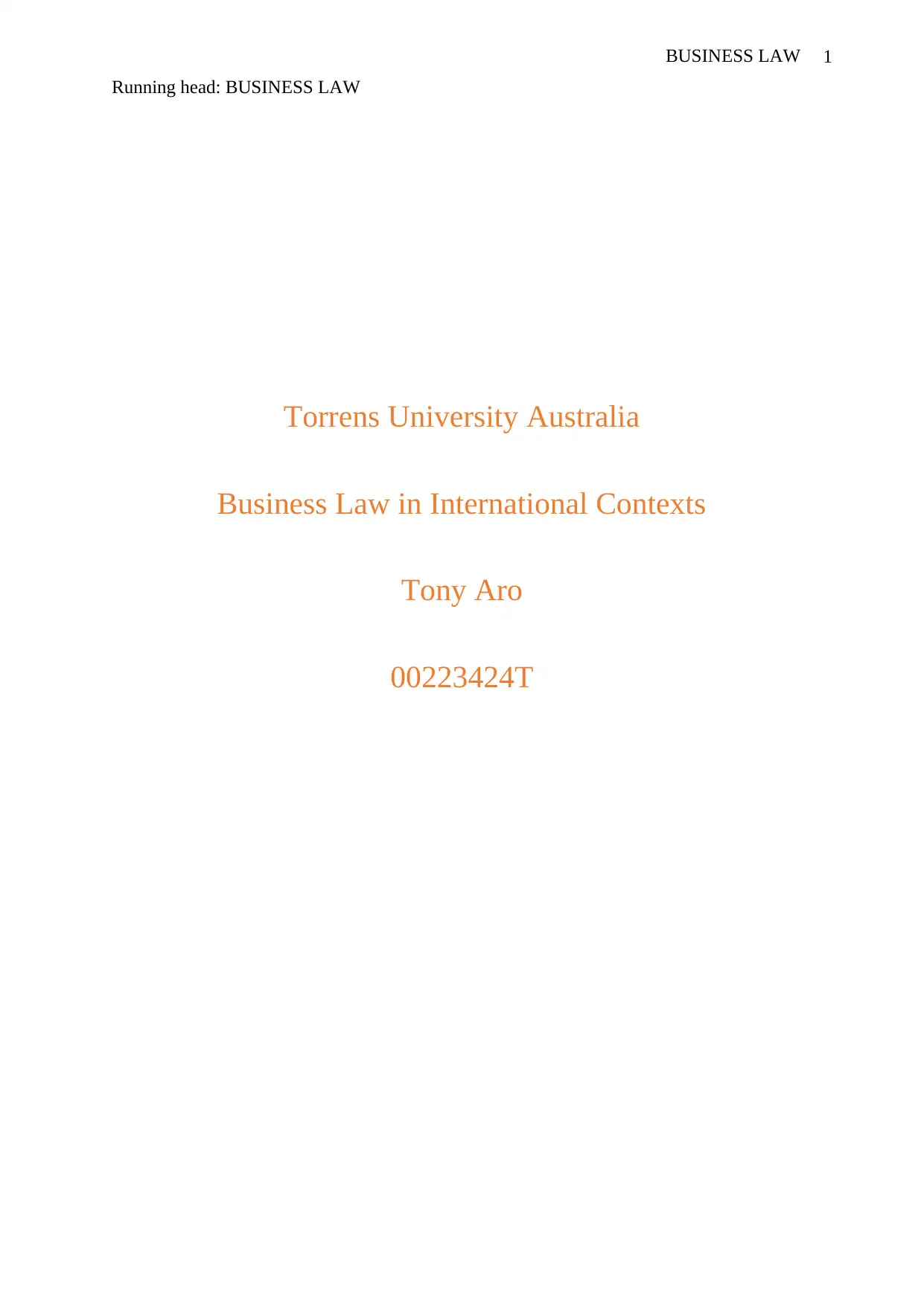
1BUSINESS LAW
Running head: BUSINESS LAW
Torrens University Australia
Business Law in International Contexts
Tony Aro
00223424T
Running head: BUSINESS LAW
Torrens University Australia
Business Law in International Contexts
Tony Aro
00223424T
Secure Best Marks with AI Grader
Need help grading? Try our AI Grader for instant feedback on your assignments.
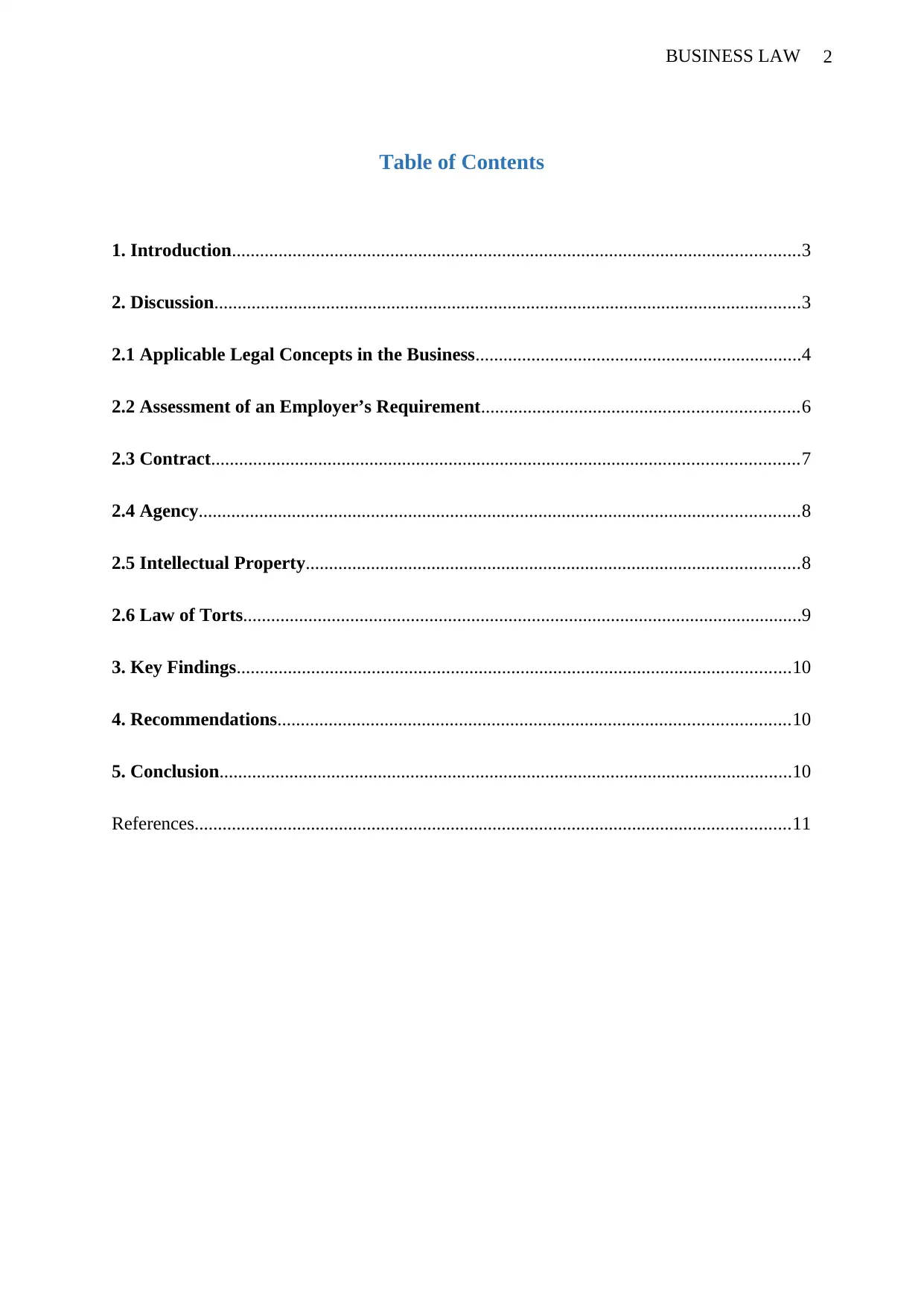
2BUSINESS LAW
Table of Contents
1. Introduction..........................................................................................................................3
2. Discussion..............................................................................................................................3
2.1 Applicable Legal Concepts in the Business......................................................................4
2.2 Assessment of an Employer’s Requirement....................................................................6
2.3 Contract..............................................................................................................................7
2.4 Agency.................................................................................................................................8
2.5 Intellectual Property..........................................................................................................8
2.6 Law of Torts........................................................................................................................9
3. Key Findings.......................................................................................................................10
4. Recommendations..............................................................................................................10
5. Conclusion...........................................................................................................................10
References................................................................................................................................11
Table of Contents
1. Introduction..........................................................................................................................3
2. Discussion..............................................................................................................................3
2.1 Applicable Legal Concepts in the Business......................................................................4
2.2 Assessment of an Employer’s Requirement....................................................................6
2.3 Contract..............................................................................................................................7
2.4 Agency.................................................................................................................................8
2.5 Intellectual Property..........................................................................................................8
2.6 Law of Torts........................................................................................................................9
3. Key Findings.......................................................................................................................10
4. Recommendations..............................................................................................................10
5. Conclusion...........................................................................................................................10
References................................................................................................................................11
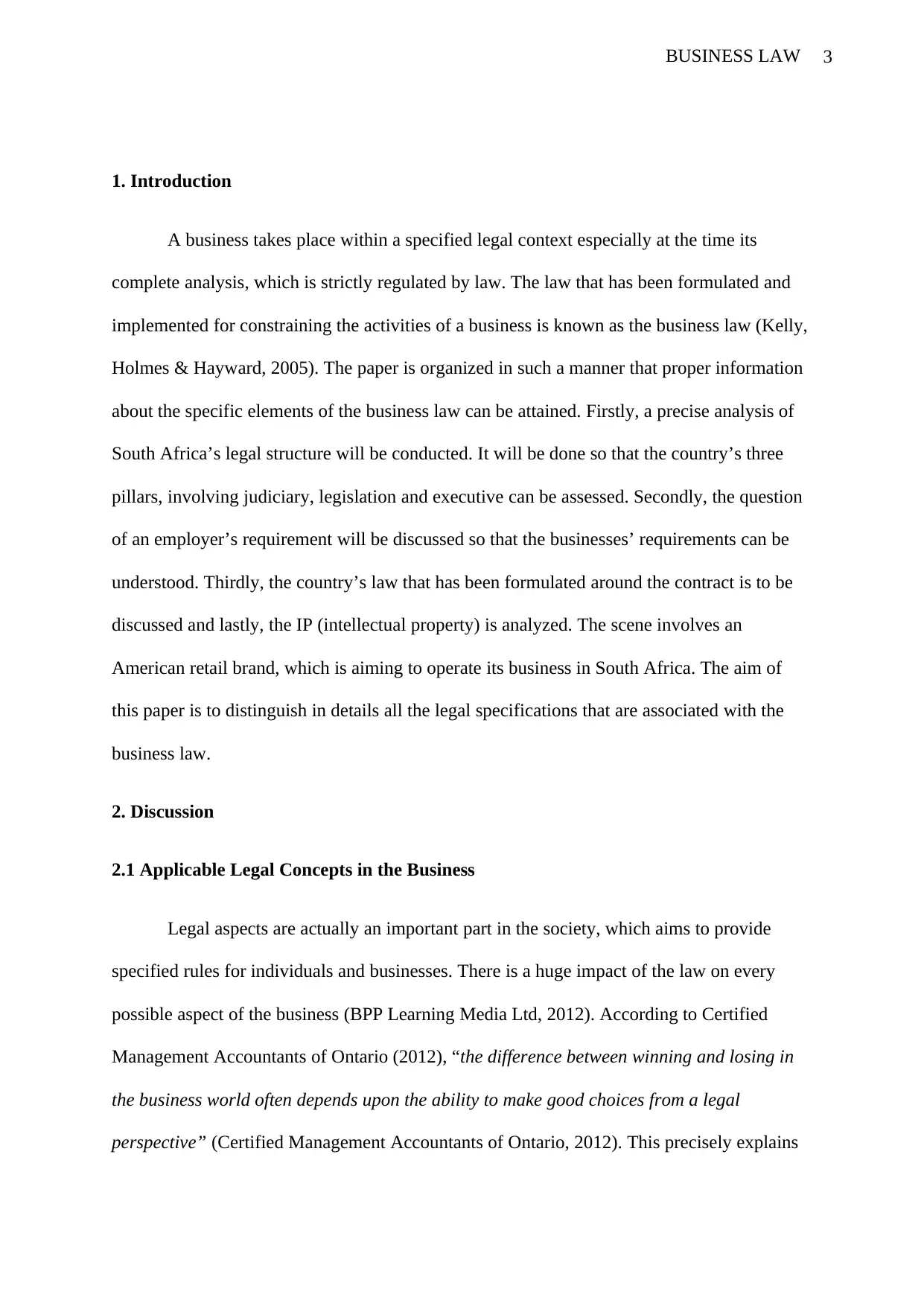
3BUSINESS LAW
1. Introduction
A business takes place within a specified legal context especially at the time its
complete analysis, which is strictly regulated by law. The law that has been formulated and
implemented for constraining the activities of a business is known as the business law (Kelly,
Holmes & Hayward, 2005). The paper is organized in such a manner that proper information
about the specific elements of the business law can be attained. Firstly, a precise analysis of
South Africa’s legal structure will be conducted. It will be done so that the country’s three
pillars, involving judiciary, legislation and executive can be assessed. Secondly, the question
of an employer’s requirement will be discussed so that the businesses’ requirements can be
understood. Thirdly, the country’s law that has been formulated around the contract is to be
discussed and lastly, the IP (intellectual property) is analyzed. The scene involves an
American retail brand, which is aiming to operate its business in South Africa. The aim of
this paper is to distinguish in details all the legal specifications that are associated with the
business law.
2. Discussion
2.1 Applicable Legal Concepts in the Business
Legal aspects are actually an important part in the society, which aims to provide
specified rules for individuals and businesses. There is a huge impact of the law on every
possible aspect of the business (BPP Learning Media Ltd, 2012). According to Certified
Management Accountants of Ontario (2012), “the difference between winning and losing in
the business world often depends upon the ability to make good choices from a legal
perspective” (Certified Management Accountants of Ontario, 2012). This precisely explains
1. Introduction
A business takes place within a specified legal context especially at the time its
complete analysis, which is strictly regulated by law. The law that has been formulated and
implemented for constraining the activities of a business is known as the business law (Kelly,
Holmes & Hayward, 2005). The paper is organized in such a manner that proper information
about the specific elements of the business law can be attained. Firstly, a precise analysis of
South Africa’s legal structure will be conducted. It will be done so that the country’s three
pillars, involving judiciary, legislation and executive can be assessed. Secondly, the question
of an employer’s requirement will be discussed so that the businesses’ requirements can be
understood. Thirdly, the country’s law that has been formulated around the contract is to be
discussed and lastly, the IP (intellectual property) is analyzed. The scene involves an
American retail brand, which is aiming to operate its business in South Africa. The aim of
this paper is to distinguish in details all the legal specifications that are associated with the
business law.
2. Discussion
2.1 Applicable Legal Concepts in the Business
Legal aspects are actually an important part in the society, which aims to provide
specified rules for individuals and businesses. There is a huge impact of the law on every
possible aspect of the business (BPP Learning Media Ltd, 2012). According to Certified
Management Accountants of Ontario (2012), “the difference between winning and losing in
the business world often depends upon the ability to make good choices from a legal
perspective” (Certified Management Accountants of Ontario, 2012). This precisely explains
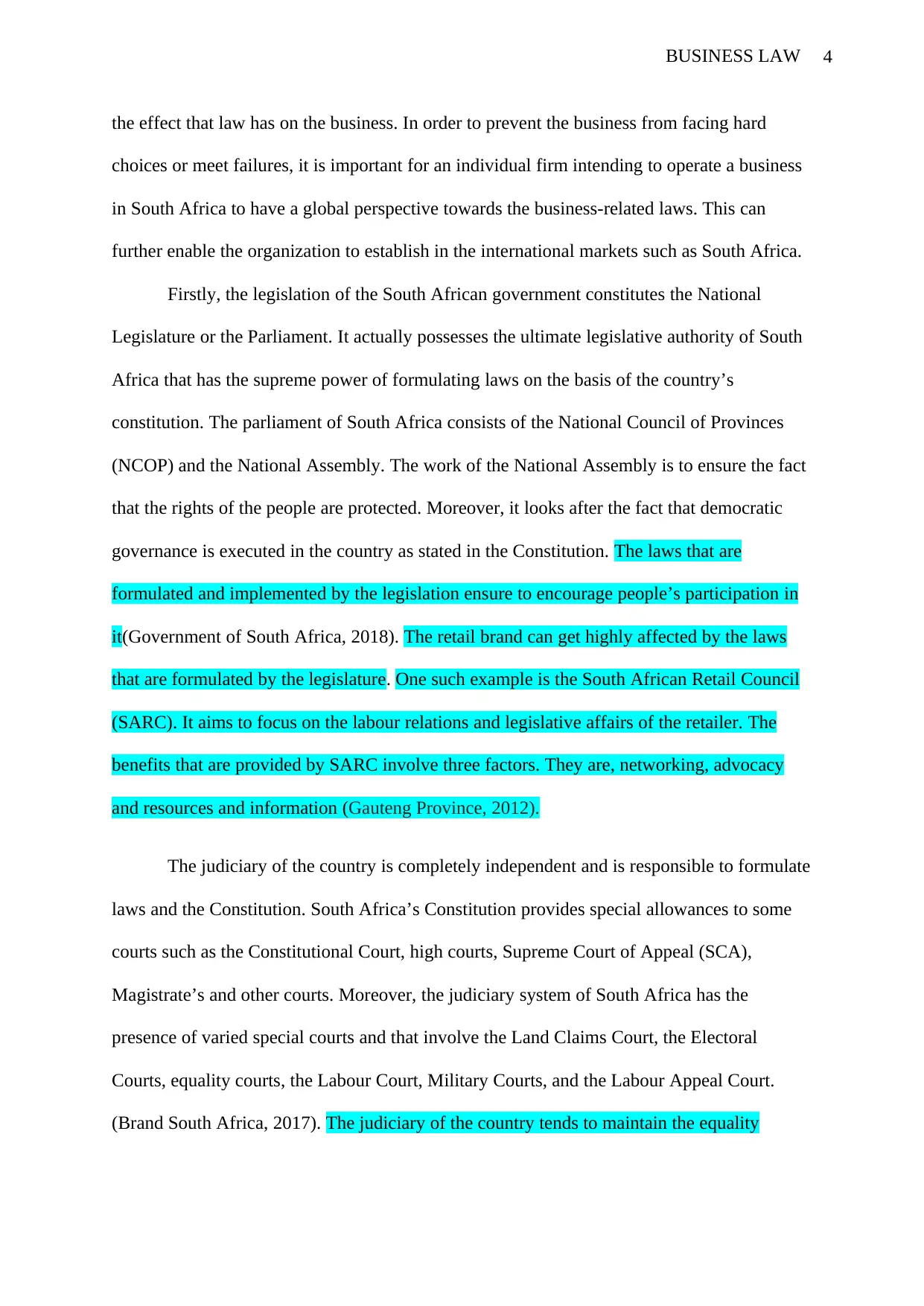
4BUSINESS LAW
the effect that law has on the business. In order to prevent the business from facing hard
choices or meet failures, it is important for an individual firm intending to operate a business
in South Africa to have a global perspective towards the business-related laws. This can
further enable the organization to establish in the international markets such as South Africa.
Firstly, the legislation of the South African government constitutes the National
Legislature or the Parliament. It actually possesses the ultimate legislative authority of South
Africa that has the supreme power of formulating laws on the basis of the country’s
constitution. The parliament of South Africa consists of the National Council of Provinces
(NCOP) and the National Assembly. The work of the National Assembly is to ensure the fact
that the rights of the people are protected. Moreover, it looks after the fact that democratic
governance is executed in the country as stated in the Constitution. The laws that are
formulated and implemented by the legislation ensure to encourage people’s participation in
it(Government of South Africa, 2018). The retail brand can get highly affected by the laws
that are formulated by the legislature. One such example is the South African Retail Council
(SARC). It aims to focus on the labour relations and legislative affairs of the retailer. The
benefits that are provided by SARC involve three factors. They are, networking, advocacy
and resources and information (Gauteng Province, 2012).
The judiciary of the country is completely independent and is responsible to formulate
laws and the Constitution. South Africa’s Constitution provides special allowances to some
courts such as the Constitutional Court, high courts, Supreme Court of Appeal (SCA),
Magistrate’s and other courts. Moreover, the judiciary system of South Africa has the
presence of varied special courts and that involve the Land Claims Court, the Electoral
Courts, equality courts, the Labour Court, Military Courts, and the Labour Appeal Court.
(Brand South Africa, 2017). The judiciary of the country tends to maintain the equality
the effect that law has on the business. In order to prevent the business from facing hard
choices or meet failures, it is important for an individual firm intending to operate a business
in South Africa to have a global perspective towards the business-related laws. This can
further enable the organization to establish in the international markets such as South Africa.
Firstly, the legislation of the South African government constitutes the National
Legislature or the Parliament. It actually possesses the ultimate legislative authority of South
Africa that has the supreme power of formulating laws on the basis of the country’s
constitution. The parliament of South Africa consists of the National Council of Provinces
(NCOP) and the National Assembly. The work of the National Assembly is to ensure the fact
that the rights of the people are protected. Moreover, it looks after the fact that democratic
governance is executed in the country as stated in the Constitution. The laws that are
formulated and implemented by the legislation ensure to encourage people’s participation in
it(Government of South Africa, 2018). The retail brand can get highly affected by the laws
that are formulated by the legislature. One such example is the South African Retail Council
(SARC). It aims to focus on the labour relations and legislative affairs of the retailer. The
benefits that are provided by SARC involve three factors. They are, networking, advocacy
and resources and information (Gauteng Province, 2012).
The judiciary of the country is completely independent and is responsible to formulate
laws and the Constitution. South Africa’s Constitution provides special allowances to some
courts such as the Constitutional Court, high courts, Supreme Court of Appeal (SCA),
Magistrate’s and other courts. Moreover, the judiciary system of South Africa has the
presence of varied special courts and that involve the Land Claims Court, the Electoral
Courts, equality courts, the Labour Court, Military Courts, and the Labour Appeal Court.
(Brand South Africa, 2017). The judiciary of the country tends to maintain the equality
Secure Best Marks with AI Grader
Need help grading? Try our AI Grader for instant feedback on your assignments.
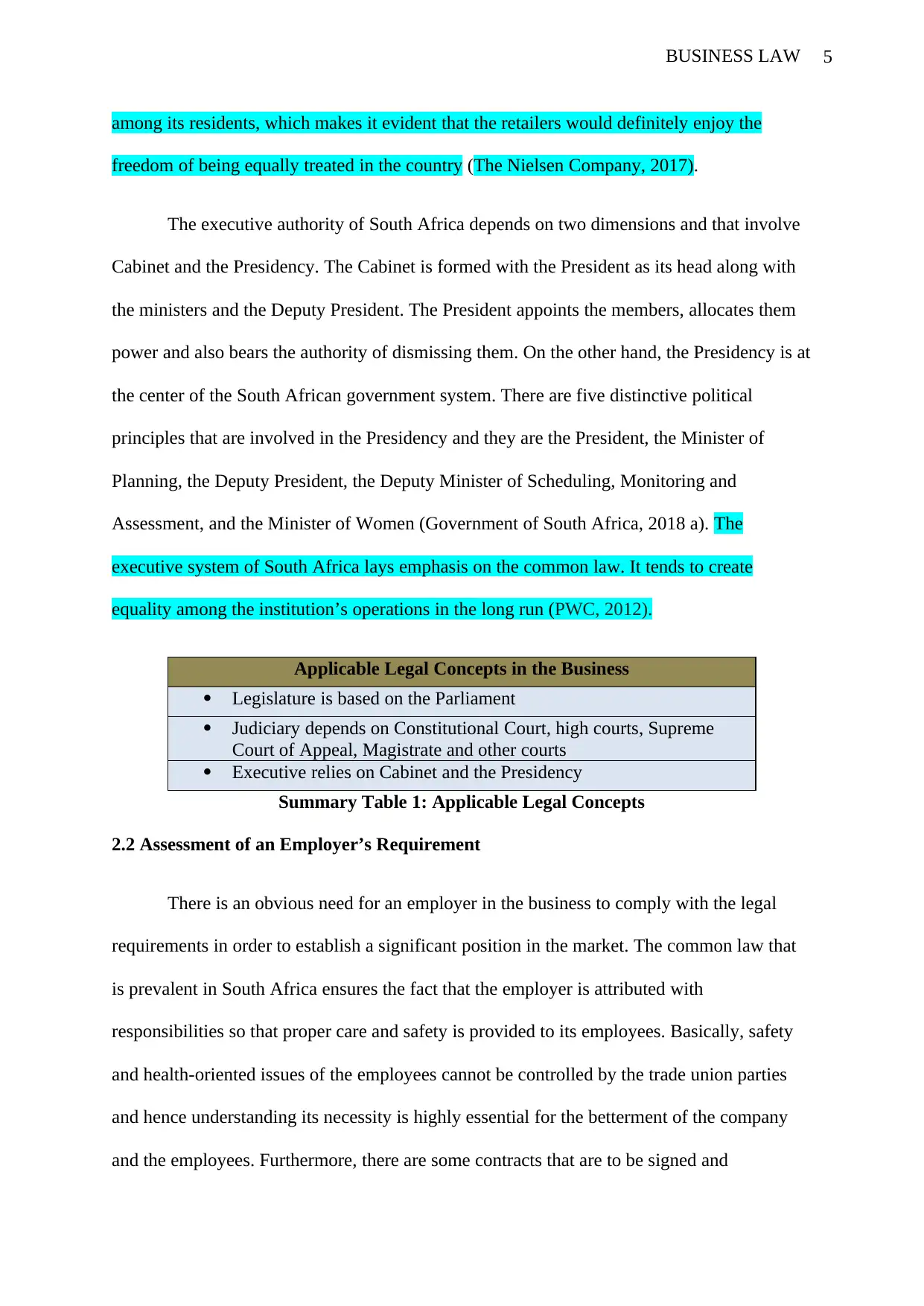
5BUSINESS LAW
among its residents, which makes it evident that the retailers would definitely enjoy the
freedom of being equally treated in the country (The Nielsen Company, 2017).
The executive authority of South Africa depends on two dimensions and that involve
Cabinet and the Presidency. The Cabinet is formed with the President as its head along with
the ministers and the Deputy President. The President appoints the members, allocates them
power and also bears the authority of dismissing them. On the other hand, the Presidency is at
the center of the South African government system. There are five distinctive political
principles that are involved in the Presidency and they are the President, the Minister of
Planning, the Deputy President, the Deputy Minister of Scheduling, Monitoring and
Assessment, and the Minister of Women (Government of South Africa, 2018 a). The
executive system of South Africa lays emphasis on the common law. It tends to create
equality among the institution’s operations in the long run (PWC, 2012).
Applicable Legal Concepts in the Business
Legislature is based on the Parliament
Judiciary depends on Constitutional Court, high courts, Supreme
Court of Appeal, Magistrate and other courts
Executive relies on Cabinet and the Presidency
Summary Table 1: Applicable Legal Concepts
2.2 Assessment of an Employer’s Requirement
There is an obvious need for an employer in the business to comply with the legal
requirements in order to establish a significant position in the market. The common law that
is prevalent in South Africa ensures the fact that the employer is attributed with
responsibilities so that proper care and safety is provided to its employees. Basically, safety
and health-oriented issues of the employees cannot be controlled by the trade union parties
and hence understanding its necessity is highly essential for the betterment of the company
and the employees. Furthermore, there are some contracts that are to be signed and
among its residents, which makes it evident that the retailers would definitely enjoy the
freedom of being equally treated in the country (The Nielsen Company, 2017).
The executive authority of South Africa depends on two dimensions and that involve
Cabinet and the Presidency. The Cabinet is formed with the President as its head along with
the ministers and the Deputy President. The President appoints the members, allocates them
power and also bears the authority of dismissing them. On the other hand, the Presidency is at
the center of the South African government system. There are five distinctive political
principles that are involved in the Presidency and they are the President, the Minister of
Planning, the Deputy President, the Deputy Minister of Scheduling, Monitoring and
Assessment, and the Minister of Women (Government of South Africa, 2018 a). The
executive system of South Africa lays emphasis on the common law. It tends to create
equality among the institution’s operations in the long run (PWC, 2012).
Applicable Legal Concepts in the Business
Legislature is based on the Parliament
Judiciary depends on Constitutional Court, high courts, Supreme
Court of Appeal, Magistrate and other courts
Executive relies on Cabinet and the Presidency
Summary Table 1: Applicable Legal Concepts
2.2 Assessment of an Employer’s Requirement
There is an obvious need for an employer in the business to comply with the legal
requirements in order to establish a significant position in the market. The common law that
is prevalent in South Africa ensures the fact that the employer is attributed with
responsibilities so that proper care and safety is provided to its employees. Basically, safety
and health-oriented issues of the employees cannot be controlled by the trade union parties
and hence understanding its necessity is highly essential for the betterment of the company
and the employees. Furthermore, there are some contracts that are to be signed and
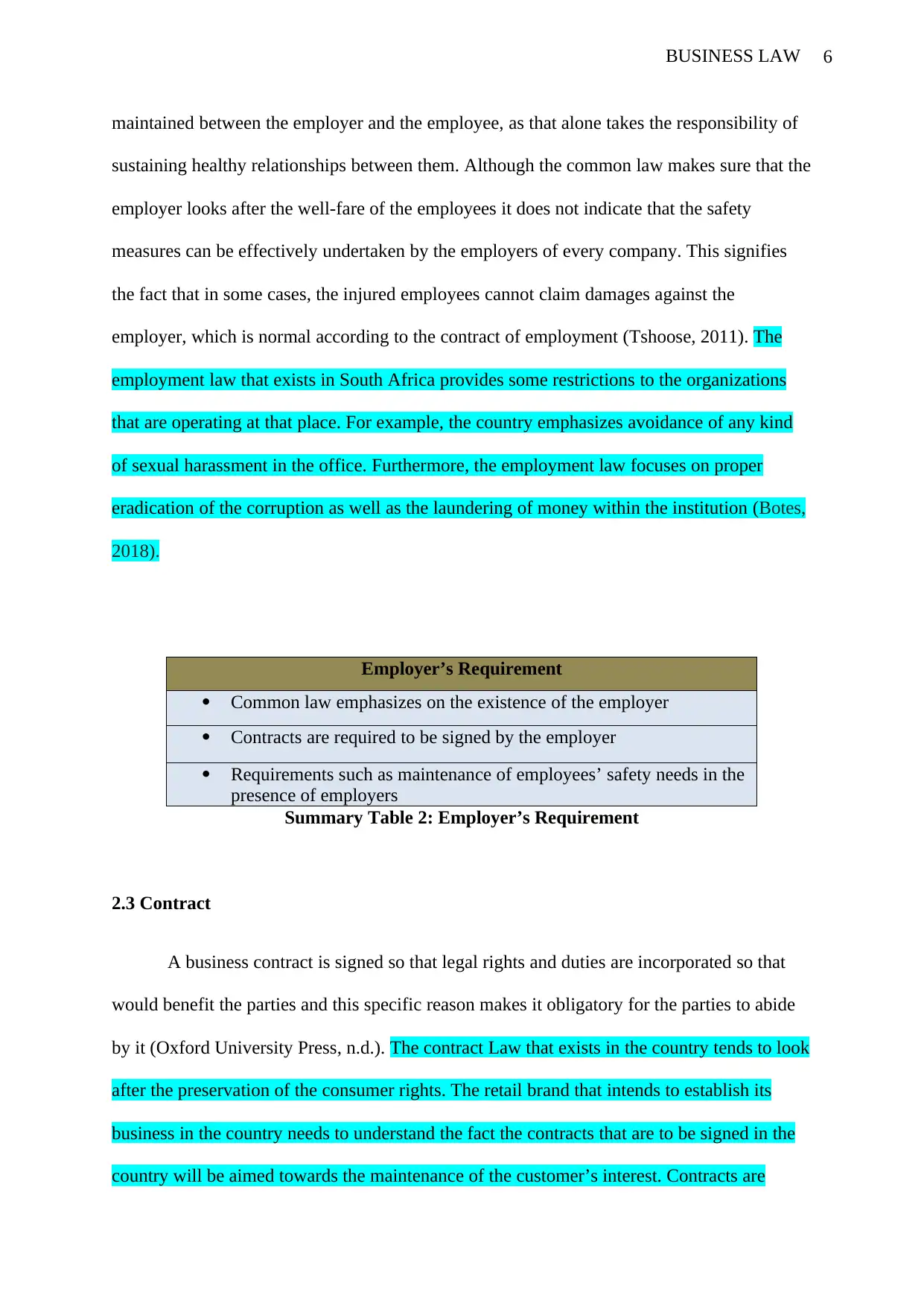
6BUSINESS LAW
maintained between the employer and the employee, as that alone takes the responsibility of
sustaining healthy relationships between them. Although the common law makes sure that the
employer looks after the well-fare of the employees it does not indicate that the safety
measures can be effectively undertaken by the employers of every company. This signifies
the fact that in some cases, the injured employees cannot claim damages against the
employer, which is normal according to the contract of employment (Tshoose, 2011). The
employment law that exists in South Africa provides some restrictions to the organizations
that are operating at that place. For example, the country emphasizes avoidance of any kind
of sexual harassment in the office. Furthermore, the employment law focuses on proper
eradication of the corruption as well as the laundering of money within the institution (Botes,
2018).
Employer’s Requirement
Common law emphasizes on the existence of the employer
Contracts are required to be signed by the employer
Requirements such as maintenance of employees’ safety needs in the
presence of employers
Summary Table 2: Employer’s Requirement
2.3 Contract
A business contract is signed so that legal rights and duties are incorporated so that
would benefit the parties and this specific reason makes it obligatory for the parties to abide
by it (Oxford University Press, n.d.). The contract Law that exists in the country tends to look
after the preservation of the consumer rights. The retail brand that intends to establish its
business in the country needs to understand the fact the contracts that are to be signed in the
country will be aimed towards the maintenance of the customer’s interest. Contracts are
maintained between the employer and the employee, as that alone takes the responsibility of
sustaining healthy relationships between them. Although the common law makes sure that the
employer looks after the well-fare of the employees it does not indicate that the safety
measures can be effectively undertaken by the employers of every company. This signifies
the fact that in some cases, the injured employees cannot claim damages against the
employer, which is normal according to the contract of employment (Tshoose, 2011). The
employment law that exists in South Africa provides some restrictions to the organizations
that are operating at that place. For example, the country emphasizes avoidance of any kind
of sexual harassment in the office. Furthermore, the employment law focuses on proper
eradication of the corruption as well as the laundering of money within the institution (Botes,
2018).
Employer’s Requirement
Common law emphasizes on the existence of the employer
Contracts are required to be signed by the employer
Requirements such as maintenance of employees’ safety needs in the
presence of employers
Summary Table 2: Employer’s Requirement
2.3 Contract
A business contract is signed so that legal rights and duties are incorporated so that
would benefit the parties and this specific reason makes it obligatory for the parties to abide
by it (Oxford University Press, n.d.). The contract Law that exists in the country tends to look
after the preservation of the consumer rights. The retail brand that intends to establish its
business in the country needs to understand the fact the contracts that are to be signed in the
country will be aimed towards the maintenance of the customer’s interest. Contracts are
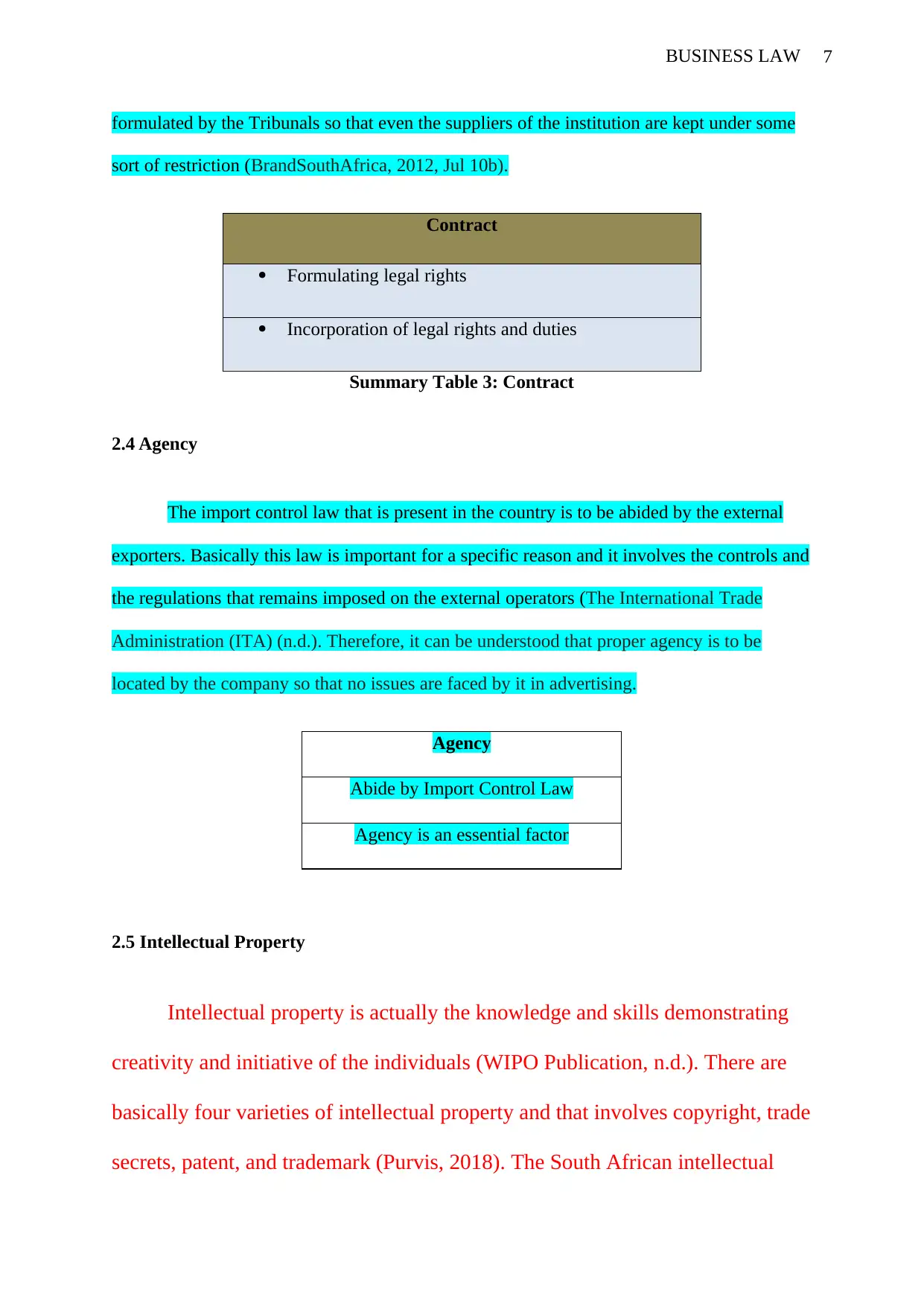
7BUSINESS LAW
formulated by the Tribunals so that even the suppliers of the institution are kept under some
sort of restriction (BrandSouthAfrica, 2012, Jul 10b).
Contract
Formulating legal rights
Incorporation of legal rights and duties
Summary Table 3: Contract
2.4 Agency
The import control law that is present in the country is to be abided by the external
exporters. Basically this law is important for a specific reason and it involves the controls and
the regulations that remains imposed on the external operators (The International Trade
Administration (ITA) (n.d.). Therefore, it can be understood that proper agency is to be
located by the company so that no issues are faced by it in advertising.
Agency
Abide by Import Control Law
Agency is an essential factor
2.5 Intellectual Property
Intellectual property is actually the knowledge and skills demonstrating
creativity and initiative of the individuals (WIPO Publication, n.d.). There are
basically four varieties of intellectual property and that involves copyright, trade
secrets, patent, and trademark (Purvis, 2018). The South African intellectual
formulated by the Tribunals so that even the suppliers of the institution are kept under some
sort of restriction (BrandSouthAfrica, 2012, Jul 10b).
Contract
Formulating legal rights
Incorporation of legal rights and duties
Summary Table 3: Contract
2.4 Agency
The import control law that is present in the country is to be abided by the external
exporters. Basically this law is important for a specific reason and it involves the controls and
the regulations that remains imposed on the external operators (The International Trade
Administration (ITA) (n.d.). Therefore, it can be understood that proper agency is to be
located by the company so that no issues are faced by it in advertising.
Agency
Abide by Import Control Law
Agency is an essential factor
2.5 Intellectual Property
Intellectual property is actually the knowledge and skills demonstrating
creativity and initiative of the individuals (WIPO Publication, n.d.). There are
basically four varieties of intellectual property and that involves copyright, trade
secrets, patent, and trademark (Purvis, 2018). The South African intellectual
Paraphrase This Document
Need a fresh take? Get an instant paraphrase of this document with our AI Paraphraser
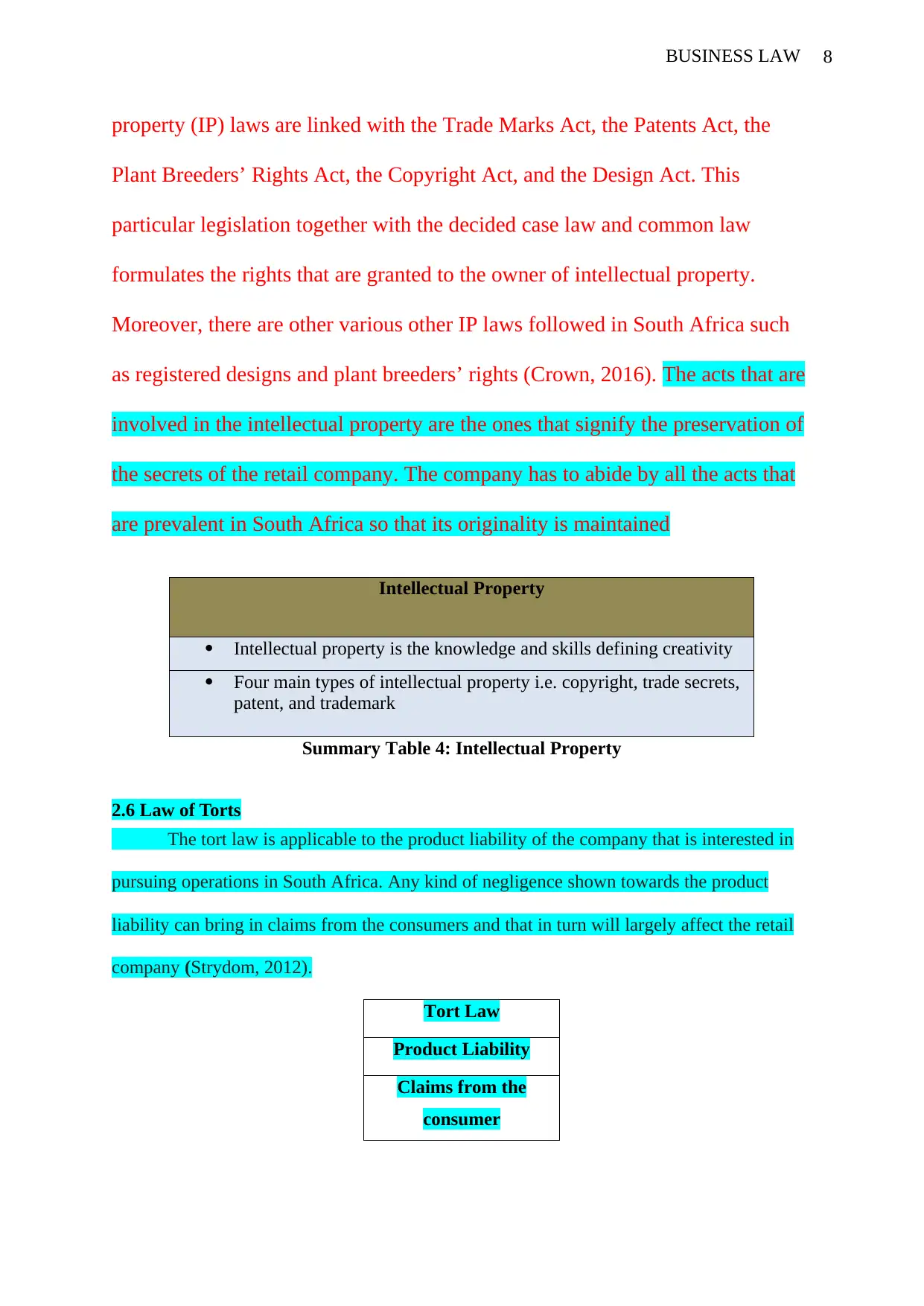
8BUSINESS LAW
property (IP) laws are linked with the Trade Marks Act, the Patents Act, the
Plant Breeders’ Rights Act, the Copyright Act, and the Design Act. This
particular legislation together with the decided case law and common law
formulates the rights that are granted to the owner of intellectual property.
Moreover, there are other various other IP laws followed in South Africa such
as registered designs and plant breeders’ rights (Crown, 2016). The acts that are
involved in the intellectual property are the ones that signify the preservation of
the secrets of the retail company. The company has to abide by all the acts that
are prevalent in South Africa so that its originality is maintained
Intellectual Property
Intellectual property is the knowledge and skills defining creativity
Four main types of intellectual property i.e. copyright, trade secrets,
patent, and trademark
Summary Table 4: Intellectual Property
2.6 Law of Torts
The tort law is applicable to the product liability of the company that is interested in
pursuing operations in South Africa. Any kind of negligence shown towards the product
liability can bring in claims from the consumers and that in turn will largely affect the retail
company (Strydom, 2012).
Tort Law
Product Liability
Claims from the
consumer
property (IP) laws are linked with the Trade Marks Act, the Patents Act, the
Plant Breeders’ Rights Act, the Copyright Act, and the Design Act. This
particular legislation together with the decided case law and common law
formulates the rights that are granted to the owner of intellectual property.
Moreover, there are other various other IP laws followed in South Africa such
as registered designs and plant breeders’ rights (Crown, 2016). The acts that are
involved in the intellectual property are the ones that signify the preservation of
the secrets of the retail company. The company has to abide by all the acts that
are prevalent in South Africa so that its originality is maintained
Intellectual Property
Intellectual property is the knowledge and skills defining creativity
Four main types of intellectual property i.e. copyright, trade secrets,
patent, and trademark
Summary Table 4: Intellectual Property
2.6 Law of Torts
The tort law is applicable to the product liability of the company that is interested in
pursuing operations in South Africa. Any kind of negligence shown towards the product
liability can bring in claims from the consumers and that in turn will largely affect the retail
company (Strydom, 2012).
Tort Law
Product Liability
Claims from the
consumer
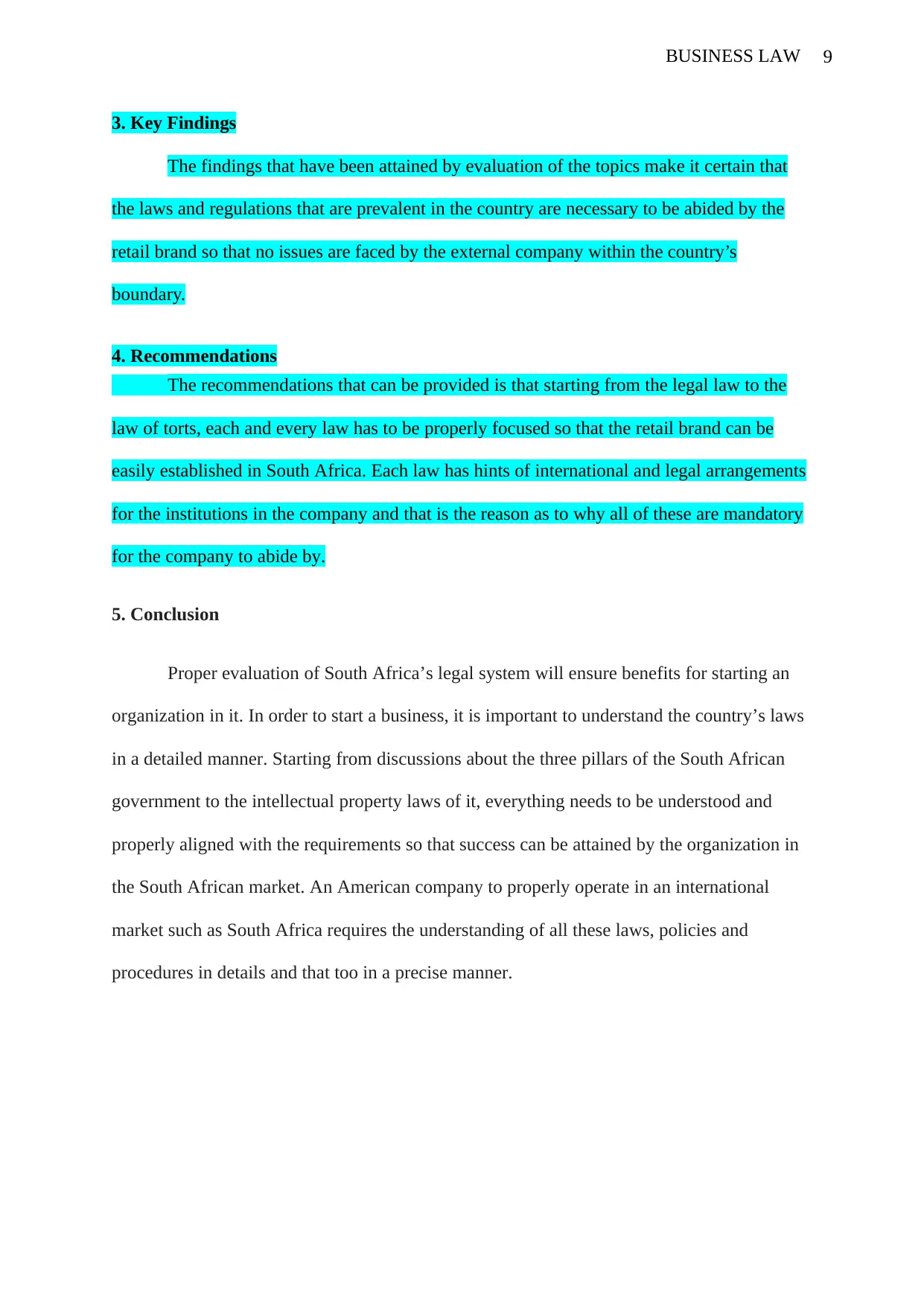
9BUSINESS LAW
3. Key Findings
The findings that have been attained by evaluation of the topics make it certain that
the laws and regulations that are prevalent in the country are necessary to be abided by the
retail brand so that no issues are faced by the external company within the country’s
boundary.
4. Recommendations
The recommendations that can be provided is that starting from the legal law to the
law of torts, each and every law has to be properly focused so that the retail brand can be
easily established in South Africa. Each law has hints of international and legal arrangements
for the institutions in the company and that is the reason as to why all of these are mandatory
for the company to abide by.
5. Conclusion
Proper evaluation of South Africa’s legal system will ensure benefits for starting an
organization in it. In order to start a business, it is important to understand the country’s laws
in a detailed manner. Starting from discussions about the three pillars of the South African
government to the intellectual property laws of it, everything needs to be understood and
properly aligned with the requirements so that success can be attained by the organization in
the South African market. An American company to properly operate in an international
market such as South Africa requires the understanding of all these laws, policies and
procedures in details and that too in a precise manner.
3. Key Findings
The findings that have been attained by evaluation of the topics make it certain that
the laws and regulations that are prevalent in the country are necessary to be abided by the
retail brand so that no issues are faced by the external company within the country’s
boundary.
4. Recommendations
The recommendations that can be provided is that starting from the legal law to the
law of torts, each and every law has to be properly focused so that the retail brand can be
easily established in South Africa. Each law has hints of international and legal arrangements
for the institutions in the company and that is the reason as to why all of these are mandatory
for the company to abide by.
5. Conclusion
Proper evaluation of South Africa’s legal system will ensure benefits for starting an
organization in it. In order to start a business, it is important to understand the country’s laws
in a detailed manner. Starting from discussions about the three pillars of the South African
government to the intellectual property laws of it, everything needs to be understood and
properly aligned with the requirements so that success can be attained by the organization in
the South African market. An American company to properly operate in an international
market such as South Africa requires the understanding of all these laws, policies and
procedures in details and that too in a precise manner.
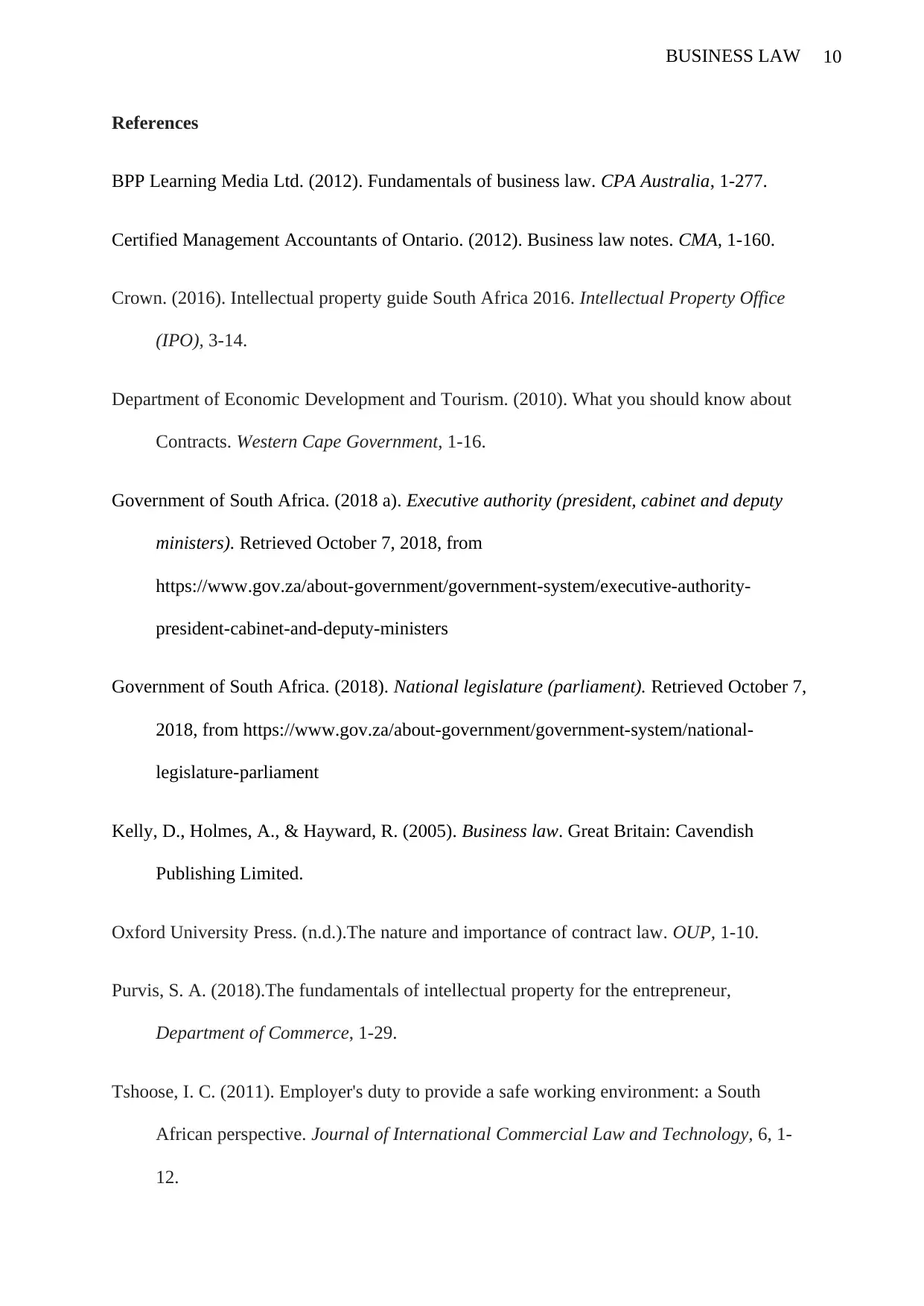
10BUSINESS LAW
References
BPP Learning Media Ltd. (2012). Fundamentals of business law. CPA Australia, 1-277.
Certified Management Accountants of Ontario. (2012). Business law notes. CMA, 1-160.
Crown. (2016). Intellectual property guide South Africa 2016. Intellectual Property Office
(IPO), 3-14.
Department of Economic Development and Tourism. (2010). What you should know about
Contracts. Western Cape Government, 1-16.
Government of South Africa. (2018 a). Executive authority (president, cabinet and deputy
ministers). Retrieved October 7, 2018, from
https://www.gov.za/about-government/government-system/executive-authority-
president-cabinet-and-deputy-ministers
Government of South Africa. (2018). National legislature (parliament). Retrieved October 7,
2018, from https://www.gov.za/about-government/government-system/national-
legislature-parliament
Kelly, D., Holmes, A., & Hayward, R. (2005). Business law. Great Britain: Cavendish
Publishing Limited.
Oxford University Press. (n.d.).The nature and importance of contract law. OUP, 1-10.
Purvis, S. A. (2018).The fundamentals of intellectual property for the entrepreneur,
Department of Commerce, 1-29.
Tshoose, I. C. (2011). Employer's duty to provide a safe working environment: a South
African perspective. Journal of International Commercial Law and Technology, 6, 1-
12.
References
BPP Learning Media Ltd. (2012). Fundamentals of business law. CPA Australia, 1-277.
Certified Management Accountants of Ontario. (2012). Business law notes. CMA, 1-160.
Crown. (2016). Intellectual property guide South Africa 2016. Intellectual Property Office
(IPO), 3-14.
Department of Economic Development and Tourism. (2010). What you should know about
Contracts. Western Cape Government, 1-16.
Government of South Africa. (2018 a). Executive authority (president, cabinet and deputy
ministers). Retrieved October 7, 2018, from
https://www.gov.za/about-government/government-system/executive-authority-
president-cabinet-and-deputy-ministers
Government of South Africa. (2018). National legislature (parliament). Retrieved October 7,
2018, from https://www.gov.za/about-government/government-system/national-
legislature-parliament
Kelly, D., Holmes, A., & Hayward, R. (2005). Business law. Great Britain: Cavendish
Publishing Limited.
Oxford University Press. (n.d.).The nature and importance of contract law. OUP, 1-10.
Purvis, S. A. (2018).The fundamentals of intellectual property for the entrepreneur,
Department of Commerce, 1-29.
Tshoose, I. C. (2011). Employer's duty to provide a safe working environment: a South
African perspective. Journal of International Commercial Law and Technology, 6, 1-
12.
Secure Best Marks with AI Grader
Need help grading? Try our AI Grader for instant feedback on your assignments.
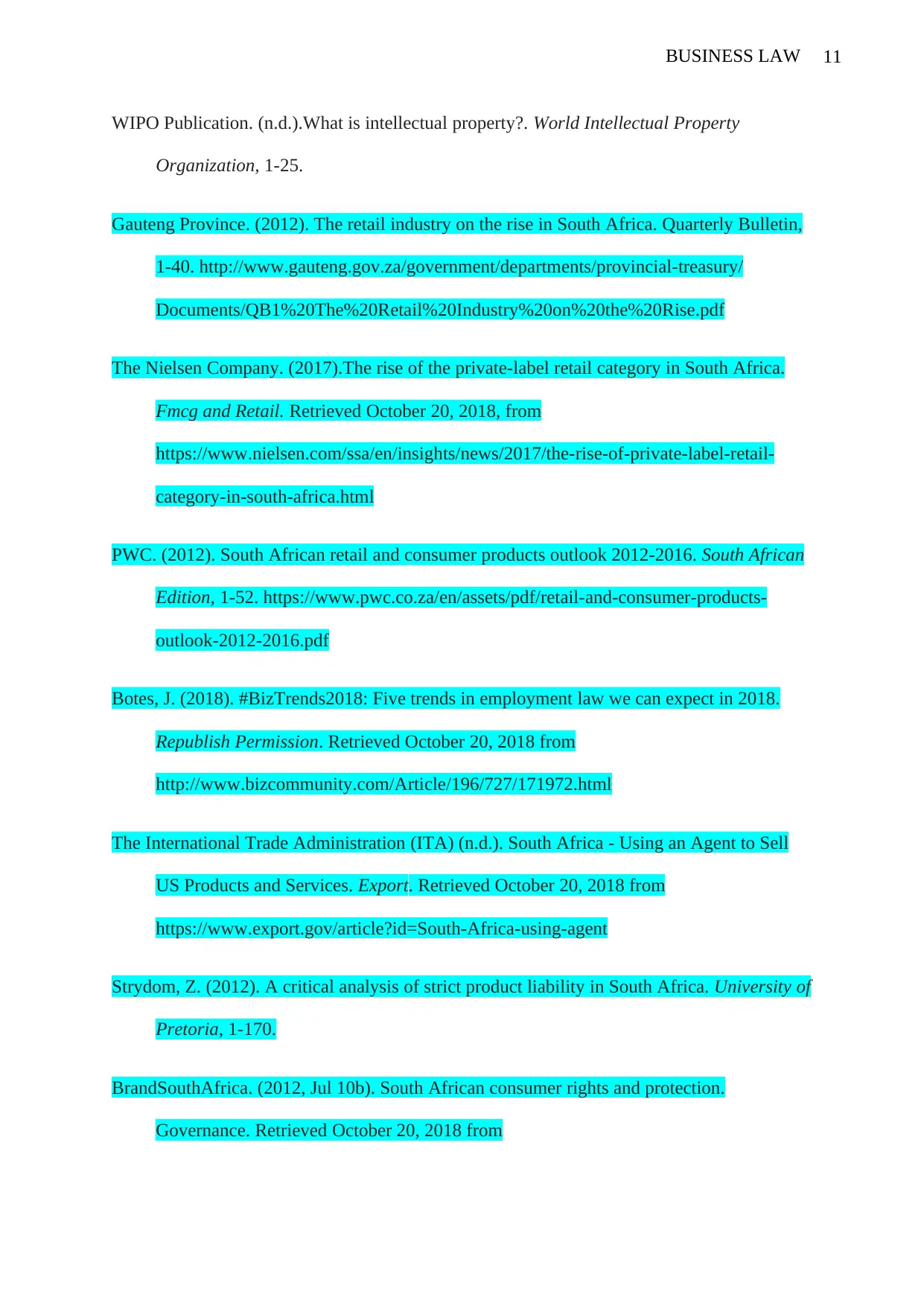
11BUSINESS LAW
WIPO Publication. (n.d.).What is intellectual property?. World Intellectual Property
Organization, 1-25.
Gauteng Province. (2012). The retail industry on the rise in South Africa. Quarterly Bulletin,
1-40. http://www.gauteng.gov.za/government/departments/provincial-treasury/
Documents/QB1%20The%20Retail%20Industry%20on%20the%20Rise.pdf
The Nielsen Company. (2017).The rise of the private-label retail category in South Africa.
Fmcg and Retail. Retrieved October 20, 2018, from
https://www.nielsen.com/ssa/en/insights/news/2017/the-rise-of-private-label-retail-
category-in-south-africa.html
PWC. (2012). South African retail and consumer products outlook 2012-2016. South African
Edition, 1-52. https://www.pwc.co.za/en/assets/pdf/retail-and-consumer-products-
outlook-2012-2016.pdf
Botes, J. (2018). #BizTrends2018: Five trends in employment law we can expect in 2018.
Republish Permission. Retrieved October 20, 2018 from
http://www.bizcommunity.com/Article/196/727/171972.html
The International Trade Administration (ITA) (n.d.). South Africa - Using an Agent to Sell
US Products and Services. Export. Retrieved October 20, 2018 from
https://www.export.gov/article?id=South-Africa-using-agent
Strydom, Z. (2012). A critical analysis of strict product liability in South Africa. University of
Pretoria, 1-170.
BrandSouthAfrica. (2012, Jul 10b). South African consumer rights and protection.
Governance. Retrieved October 20, 2018 from
WIPO Publication. (n.d.).What is intellectual property?. World Intellectual Property
Organization, 1-25.
Gauteng Province. (2012). The retail industry on the rise in South Africa. Quarterly Bulletin,
1-40. http://www.gauteng.gov.za/government/departments/provincial-treasury/
Documents/QB1%20The%20Retail%20Industry%20on%20the%20Rise.pdf
The Nielsen Company. (2017).The rise of the private-label retail category in South Africa.
Fmcg and Retail. Retrieved October 20, 2018, from
https://www.nielsen.com/ssa/en/insights/news/2017/the-rise-of-private-label-retail-
category-in-south-africa.html
PWC. (2012). South African retail and consumer products outlook 2012-2016. South African
Edition, 1-52. https://www.pwc.co.za/en/assets/pdf/retail-and-consumer-products-
outlook-2012-2016.pdf
Botes, J. (2018). #BizTrends2018: Five trends in employment law we can expect in 2018.
Republish Permission. Retrieved October 20, 2018 from
http://www.bizcommunity.com/Article/196/727/171972.html
The International Trade Administration (ITA) (n.d.). South Africa - Using an Agent to Sell
US Products and Services. Export. Retrieved October 20, 2018 from
https://www.export.gov/article?id=South-Africa-using-agent
Strydom, Z. (2012). A critical analysis of strict product liability in South Africa. University of
Pretoria, 1-170.
BrandSouthAfrica. (2012, Jul 10b). South African consumer rights and protection.
Governance. Retrieved October 20, 2018 from
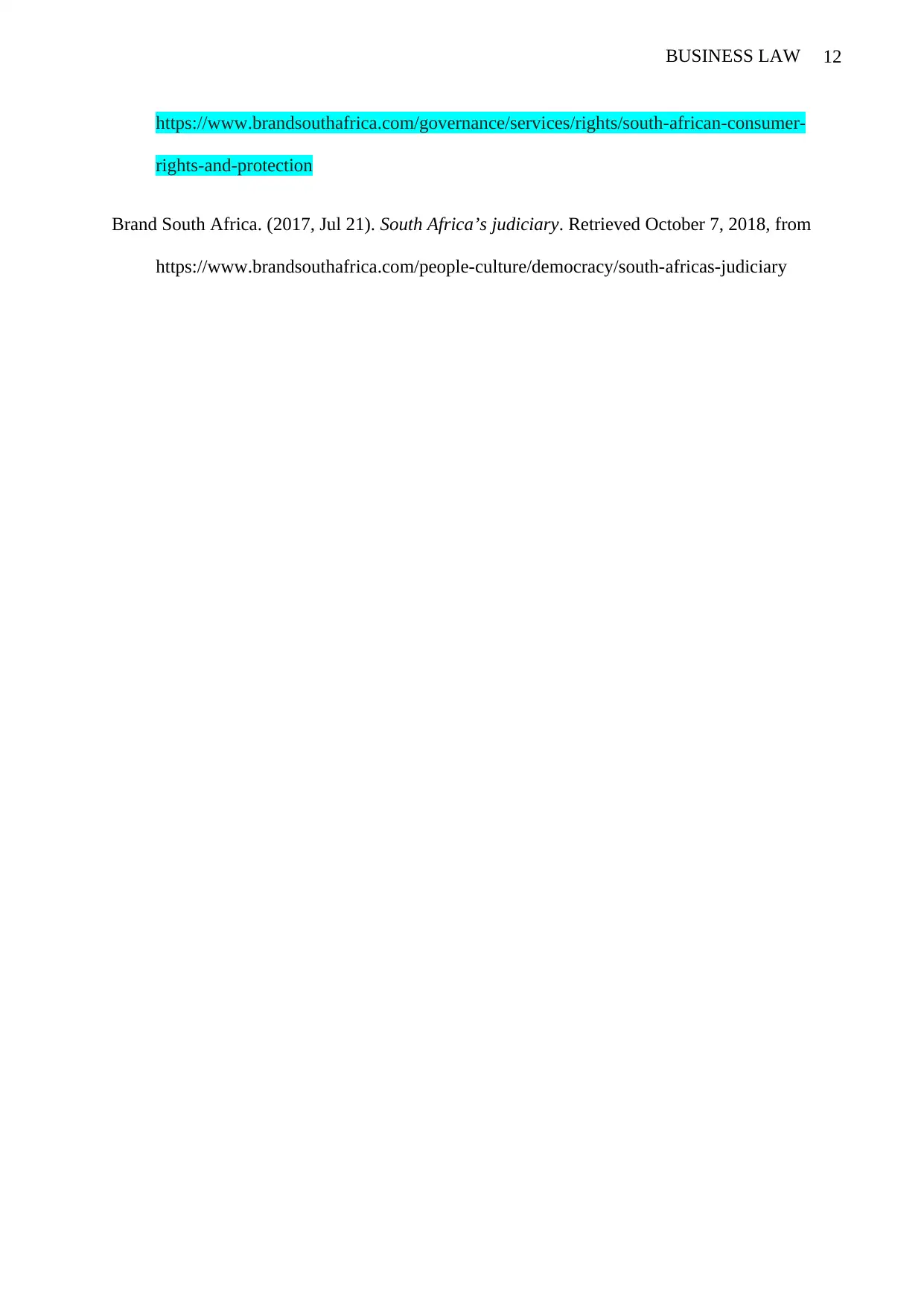
12BUSINESS LAW
https://www.brandsouthafrica.com/governance/services/rights/south-african-consumer-
rights-and-protection
Brand South Africa. (2017, Jul 21). South Africa’s judiciary. Retrieved October 7, 2018, from
https://www.brandsouthafrica.com/people-culture/democracy/south-africas-judiciary
https://www.brandsouthafrica.com/governance/services/rights/south-african-consumer-
rights-and-protection
Brand South Africa. (2017, Jul 21). South Africa’s judiciary. Retrieved October 7, 2018, from
https://www.brandsouthafrica.com/people-culture/democracy/south-africas-judiciary
1 out of 12
Related Documents
Your All-in-One AI-Powered Toolkit for Academic Success.
+13062052269
info@desklib.com
Available 24*7 on WhatsApp / Email
![[object Object]](/_next/static/media/star-bottom.7253800d.svg)
Unlock your academic potential
© 2024 | Zucol Services PVT LTD | All rights reserved.





